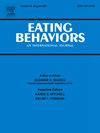Prospective reciprocal relations between psychosocial impairment and eating disorder symptoms in a high-risk sample
IF 2.4
3区 医学
Q2 PSYCHIATRY
引用次数: 0
Abstract
Impairment in psychosocial functioning increases risk for future onset of eating disorders and a treatment that produced larger reductions in eating disorder symptoms also produced larger improvements in psychosocial functioning. However, no studies have tested whether there is a prospective reciprocal relationship between psychosocial impairment and eating disorder symptoms. Accordingly, the current study tested the hypotheses that baseline psychosocial functioning would predict future increases in eating disorder symptoms and that baseline eating disorder symptoms would predict future increases in psychosocial impairment. These questions were addressed with data from a large sample (N = 1952; M = age 19.7, SD = 5.7) of adolescent girls and young women at high risk for eating pathology due to body image concerns who were followed over a 3-year period. Findings suggest a reciprocal relationship between eating disorder symptoms and psychosocial impairment. Elevated eating disorder symptoms at baseline predicted future increases in psychosocial impairment over 3-year follow-up and elevated psychosocial impairment at baseline predicted future increases in eating disorder symptoms over 3-year follow-up. Both reciprocal effects were small-medium in magnitude (partial η2 = 0.05 and 0.03, respectively). These results suggest that psychosocial impairment is a risk factor for future escalations in eating pathology and should be a target in prevention programs. Additionally, it may be useful for treatments to focus on reducing the impact of eating pathology on psychosocial functioning, which is a novel intervention target for eating disorder treatment.
在一个高风险样本中,心理社会障碍和饮食失调症状之间的预期相互关系
社会心理功能的损害增加了未来发生饮食失调的风险,一种使饮食失调症状大幅减轻的治疗也使社会心理功能得到了更大的改善。然而,目前还没有研究测试心理社会障碍和饮食失调症状之间是否存在预期的相互关系。因此,目前的研究测试了以下假设:基线心理社会功能可以预测未来饮食失调症状的增加,而基线饮食失调症状可以预测未来心理社会障碍的增加。这些问题是用大样本的数据来解决的(N = 1952;M =年龄19.7,SD = 5.7),这些青少年女孩和年轻女性由于对身体形象的担忧而有饮食病理的高风险,他们被跟踪了3年。研究结果表明,饮食失调症状与心理社会障碍之间存在相互关系。基线时饮食失调症状升高预示着未来3年随访中心理社会障碍的增加,基线时心理社会障碍升高预示着未来3年随访中饮食失调症状的增加。两种互反效应均为中小型(偏η2分别= 0.05和0.03)。这些结果表明,社会心理障碍是未来饮食病理升级的一个危险因素,应该成为预防计划的目标。此外,减少饮食病理对心理社会功能的影响可能有助于治疗,这是饮食失调治疗的新干预目标。
本文章由计算机程序翻译,如有差异,请以英文原文为准。
求助全文
约1分钟内获得全文
求助全文
来源期刊

Eating behaviors
Multiple-
CiteScore
4.20
自引率
3.60%
发文量
65
审稿时长
60 days
期刊介绍:
Eating Behaviors is an international peer-reviewed scientific journal publishing human research on the etiology, prevention, and treatment of obesity, binge eating, and eating disorders in adults and children. Studies related to the promotion of healthy eating patterns to treat or prevent medical conditions (e.g., hypertension, diabetes mellitus, cancer) are also acceptable. Two types of manuscripts are encouraged: (1) Descriptive studies establishing functional relationships between eating behaviors and social, cognitive, environmental, attitudinal, emotional or biochemical factors; (2) Clinical outcome research evaluating the efficacy of prevention or treatment protocols.
 求助内容:
求助内容: 应助结果提醒方式:
应助结果提醒方式:


